I have seen various prompts from the historians of today suggesting that this (life during the global shutdown of Covid-19) is something future historians will be interested in, and will wish to find primary sources of accounts of daily life. This is mine. I intend to update this post periodically. When I do so, I will start with the date and location of that writing. I will keep these updates here on this same post, in order to prevent spamming my followers with updates about a situation they are already stressing over. I am writing this on my blog instead of somewhere else because I haven’t kept a journal in years, and because posting this here will allow future historians to correlate what I have expressed here with what I believe about a variety of other topics.
Friday, March 21, 2020 (Seattle, WA):
Life is changing so rapidly that the rate of change has outpaced the internet, which is saying a lot. Every day sees significant changes to how we live, updated government mandates, changes to the collective knowledge humanity has about Covid-19, and more and more restrictions. The changes in medical knowledge happen so rapidly that sometimes doctors are still acting on previous news even though the WHO (World Health Organization) recommendations were updated. I’m pretty sure a global debate over whether ibuprofen and NSAIDs are safe for Covid-19 patients to take was started by a single doctor’s tweet. I’m “pretty sure” rather than “actually sure” because there is so much conflicting information even from legitimate sources that it is difficult to know what is real. That phenomenon is one that extends well beyond this virus, though, and has long been a festering problem here in the USA.
When we first heard about the virus here, it was limited to Wuhan, China. At least, that was what we were told; we found out later that China had tried to cover it up and severely punished the doctors who spoke out about it. It had been around longer than they were telling people. When it first came here to King County, I noticed the report of the diagnosis. Then, social media’s consensus buzz (at least, within my bubble) was that it wasn’t here yet. People became surprised when they noticed double-digit numbers of diagnoses. I found their surprise surprising and wondered why they had originally thought there were no cases here.
Testing has been slow here in the USA. Other countries got on that much faster than we did, and as a result, it is my personal opinion that Covid-19 has moved much further through the population than our numbers show. I’m pleased that so many states are shutting things down. Social isolation isn’t perfect, but without adequate testing to ensure proper quarantine and no vaccine, it’s our best bet for slowing this down. It appears to mutate about once every 14 days, or about once every other person it moves through. That means, in my mind (and I am not a doctor), that it will be similar to the flu if we can’t get an early lock down on it in terms of having a bazillion strains and no real way to create herd immunity. The difference, of course, is that SARS viruses are a lot harder on the body, require significantly more hospitalization, have longer recovery times, and result in more deaths per person who catches it. Older people die the most from it, too, and with their deaths we lose a significant amount of cultural value. Anything that targets a specific group of people threatens the diversity of the population, and diversity is an incredibly powerful part of what makes human collaboration so wonderful and powerful. My impression is that a lot of people don’t care if old people get sick or die. I have never understood that mindset. They are people, same as the rest of us. They are alive, and deserve to stay healthy just as much as anyone else. Their value is not diminished with their age. If anything, it’s the opposite. Their brains are walking history books and encyclopedias. They have so very much to offer our community.
When the initial suggestions to start reducing social interaction came out, businesses and events started closing and cancelling one at a time. It was like watching pieces of your life slip away quietly. Then, UW (University of Washington) closed its classrooms and made all courses shift to online. That was the start of the school closures in this state. Something I read said it was the first closure in the nation, but articles that claim something is the “first” aren’t always accurate. Like how most of Seattle thinks the mall in Northgate was the first one ever built and got all depressed about it closing because of that even though it wasn’t the first. Or all those men who are credited for being the first to do something a woman did first, or white people credited for being the first to do something someone of a different race did. But I digress.
As the schools began to close, I felt very afraid. I wasn’t afraid of the virus. I was afraid of losing my livelihood. I work two jobs. One is at a community college, supporting the chemistry lab. One is as an art teacher in after school programs. My boss runs a third party company that provides teachers and supplies. Schools contract with our company, and we go teach art, hand sewing, and machine sewing classes at elementary schools. In a typical term, I work at five different schools each week, six if you count the college. My first job to disappear was the one at the college. The school shifted all classes to a digital format with only a week or two of labs left. My boss sent us an e-mail and suddenly there were no hours at that job. Just, *poof* no work. At the other job, my boss got creative. She offered us hours doing behind-the-scenes work cutting out project pieces and organizing supplies in the stock room and so on via an online signup sheet. There were two weeks worth of signups available for anyone whose classes were canceled due to Covid-19 related closures. By the time the first week came to a close, the long term closures of all schools had been announced. With that, my boss closed the signups. With no income from parents signing their kids up for our classes, there is no money for her to pay us. There are no hours left until the schools open again on April 27th. (Personally, I think that the school closures are going to get extended.) Now, she is trying to come up with more creative solutions. She is selling pre-packaged kits of projects we usually do in class and is trying to come up with a way for us to teach projects digitally. She’s doing everything she can to keep as many of us working as possible. She has also gone out of her way to make sure that all of us know what all of the available government assistance programs are, and is providing us with resources for other ways to find related work. I don’t know how she does all of that while also raising a toddler, but here we are. World’s best boss.
In December of last year, I lost my public health insurance because I made something like $80-$100 too much per month when I picked up one of the above jobs. That meant I had to start paying over $300 per month for health insurance premiums, plus start paying copays for my prescriptions and doctor’s appointments. I couldn’t really afford to do that, but I tried. I paid for December, and for January. In January I got sick and used up the last of my sick leave. February I got sick again, starting on the evening of February 12, and this time it was extremely severe. My symptoms matched Covid-19, except that I had no fever. I was in respiratory distress so severe on February 13th I almost called 911, but it only lasted for about 4 hours before it turned into a frequent, severe, dry cough. This was after the first diagnosis in King County, but before the social media buzz became aware of it. If I had Covid-19, I would have been one of the first known cases. My cough lasted for about a month, slowly tapering off. This meant I had a significant period of simply going without pay, as I had already used up my sick leave. I couldn’t afford to pay for my health insurance. I waited until I got my paycheck in March to call the company and pay my bill for February and March, as a friend who works in health insurance told me that you can go up to 3 months before they cancel your coverage for nonpayment. My friend was wrong. When I called, I found out that they had cancelled my insurance coverage as of January 31st without notifying me. Over $600 of debt I thought I had was gone. Governor Inslee has also initiated a special open enrollment period for health insurance. I applied earlier this week, and was accepted to Apple Health. (Apple Health is our state’s version of Medicaid, which is also known as the Affordable Care Act or Obamacare or state insurance.) Suddenly, I have full healthcare coverage. What a relief!
Going back to the closures and loss of jobs: At first I was terrified. Losing both of my jobs at the same time after already losing a serious chunk of my income was not a circumstance I foresaw as being at all likely when I set up my life to be the way that it is. I also didn’t predict a global pandemic. I desperately shared my Patreon page, posted new things to my Etsy, and offered to sell my time for a variety of forms of labor to my Facebook friends in an effort to have any semblance of an income. I scrambled to find work. I have applied for dozens of jobs since all this started, and I haven’t landed a single interview. With all the closures, I imagine the very limited job market is utterly swamped with applicants. Governor Inslee has closed most businesses, not just the schools. He has also ordered the requirements around standby unemployment (the kind where you know you will return to work at your same job) to be relaxed during this crisis. Before this, I would not have qualified because I was working part time at each job. Thanks to the order, I do qualify. I think it’s ridiculous that a special exception had to be made for part time workers to qualify for unemployment. This is the way it should have been, and I hope we can make it a permanent change.
When I applied last week, I was denied despite Inslee’s orders. That’s because the automated online system wasn’t adjusted to deal with the new orders. There is a hotline that you can call to let them know your application is related to Covid-19 closures, but my other roommate who is unemployed from closures tried all day and was unable to get through due to the high volume of traffic. At her suggestion, I instead wrote an appeal letter, and yesterday one of my other roommates took it to his job where there is a fax machine. He faxed it in for me, and today I got my notice that my application was approved. I have no idea how much money they plan to give me but the relief is already washing over me in waves. Rent didn’t go away. Only my income did.
I got lucky with the timing. Friday was the last day that roommate went to work in person. He has been instructed to work from home starting Monday. The company he works for provided him with a shiny new internet router. The connection is much faster now. Our fourth roommate is coworkers with him and has also been ordered to work from home. With them working from home and the other two of us unemployed, life is about to change significantly in our house on Monday. Everyone will be home almost all of the time. That’s not at all typical, and I wonder what it will be like for us.
Today I went to help an older friend with her garden. I trimmed her roses, mowed her lawn, and weeded her vegetable boxes. We didn’t hug, and I started with washing my hands, two unusual things. She let me have some of her pots that she isn’t using anymore, and I took them home to make a vegetable container garden. With all the changes to the food banks (I’ll get to that in a moment), I’m not convinced I’ll have adequate food access in the near future. I enjoy growing some of my own food anyway; getting set up as soon as I can to do it seems prudent. Our federal government is not handling this well, and if systems break down, I want to be able to eat something fresh. In that sense, it’s kind of nice that the timing of this aligns with spring planting season.
After I left my friend’s house this afternoon, I stopped by a local hardware store in her neighborhood to pick up some potting soil and compost. Seattle has a fantastic composting program. People and businesses all over town have access to compost dumpsters, for things like food waste and garden clippings. The city turns compostable waste into garden products. It costs a little bit more than the brand name versions, but I believe in the program and closing waste loops, so it’s what I always go for if I can.
When I arrived at the store, this is what I saw:

There was also an employee standing by the chairs, who stepped inside when I asked if it was okay to take a picture for this blog. Here is a closeup of what the signs on the chairs said:
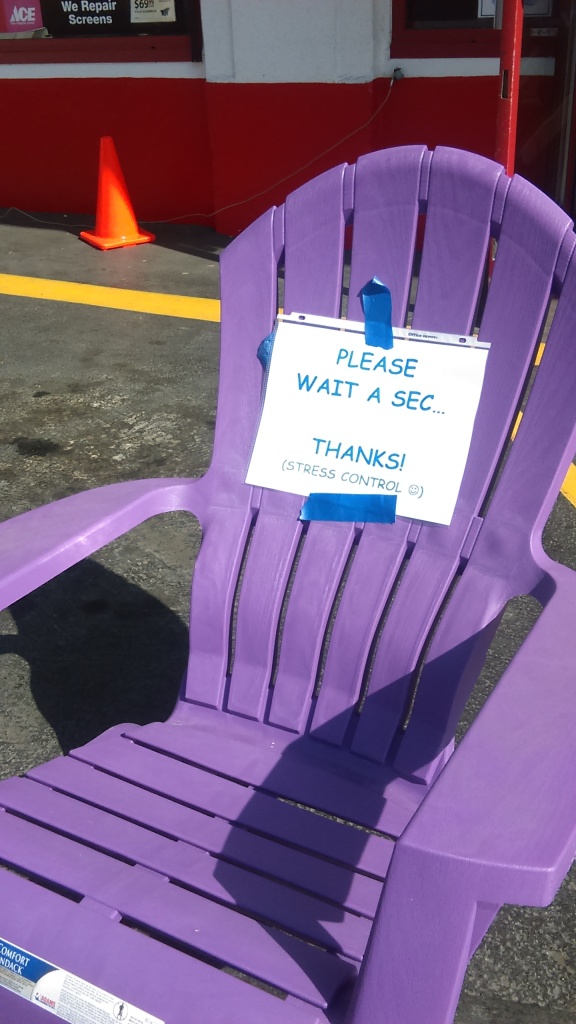
Inside the door, there was a hand sanitizer station with another sign:
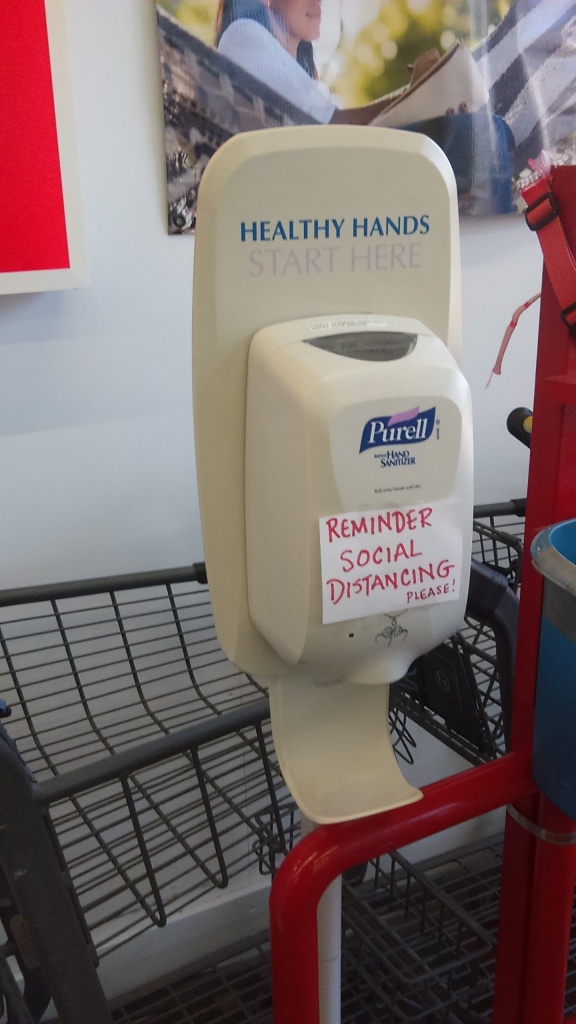
When I walked in, there was a display of bleach bottles just beyond the hand sanitizer station. Someone was shopping for them, and explained to a worker that “I tried to buy the kind for laundry, but it says ‘not for disinfecting’ on the label, so, you know, I don’t know if that kind is good enough.”
Signs that looked a bit more official than the one on the hand sanitizer station were all over the store, such as this one:
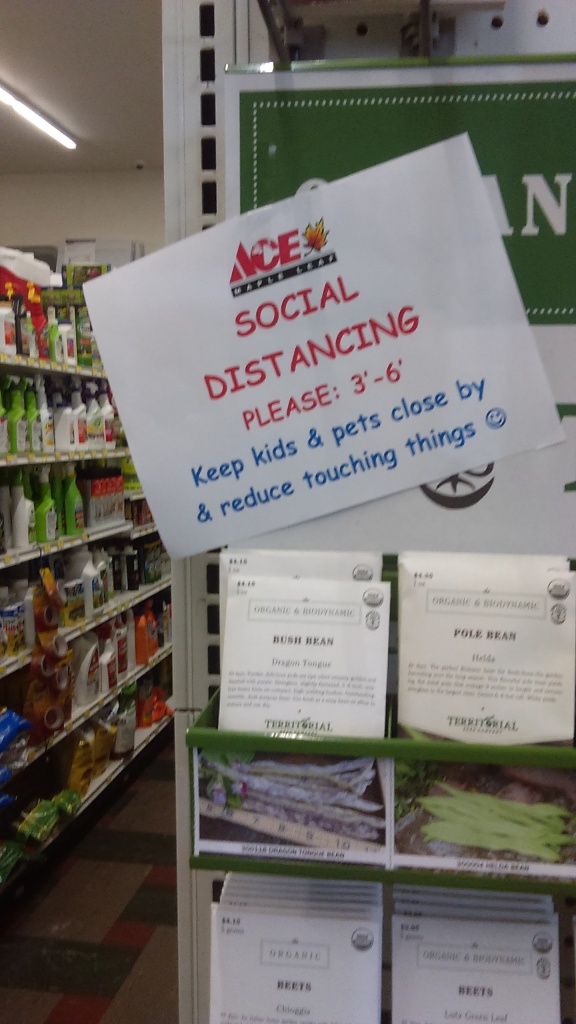
After I found what I wanted, I discovered that the line was set up with yellow marks on the floor every three feet to ensure social distancing. I was surprised, since the food bank had them set up every 6 feet.

When I got to the register, I discovered that the store had a new policy that cashiers weren’t allowed to touch the merchandise customers brought up. I was asked to turn each item so that the cashier could scan the barcodes with the scan gun. When I paid, I cracked a joke about how nice it was that we already have keypads set up for customers to swipe their own cards. I remember when cashiers always had to swipe all the cards themselves. It’s nice that we had that little technological shift and all the infrastructure changes that go with that before all this happened.
So, food banks. I have been living on food bank food for a significant portion of my adult life, both in California and here in Washington. I have a couple of very old posts about good food bank experiences and less good ones. The gist of the difference comes down to three things: Quality of food, food bank culture, and freedom of choice. Good food banks will strive to get semi-decent food. You’ll still be handed expired food, but not if it has gone bad. Bad food banks don’t care and hand you rotting vegetables with regularity. Good food banks create a culture of shared community. Bad ones treat the people who need food help as something less than human. Good food banks allow people to make choices about what they eat. Bad food banks hand out pre-packaged bags of food with no choices. So far, every food bank I have been to has either been good in all three categories or bad in all three.
The weekly food bank I have been using for the last three years has been amazing in all three categories. The food is sorted by type into bins. Each bin has a number that tells you the max of how many you are allowed to take from that bin to ensure everyone gets what they need. Usually, the number of options in each bin exceeds the number written on it, providing ample room for choice. If you are allergic to everything in a bin, the staff will find you something else if they can. If there’s something rotting in a bin, the staff will apologize and remove it. They are always friendly and treat you like a real person whose ability to eat both a balanced diet and food you actually like really matters, no matter how stressed they are.
That’s how they usually are, anyway. Two Thursdays ago there were significant changes. Instead of sorting through bins to find what you want, they had us point to what we want and wait for a staff member to hand it to us. This was meant to stop people from touching everything. The staff was super stressed out. It didn’t go well for them.
When I went back again two days ago, the system was completely different. There was no more choice. No more bins. Food was divided up into pre-packaged brown paper grocery bags with produce in plastic grocery bags. (Side note: I have no idea where they got those bags, since we no longer have plastic grocery bags here.) The bags were handed out through the window, keeping the entire line outside instead of in the internal hallway where it usually is. The staff was so stressed out that I could hear it in their voices well before I could see them. The line was marked out with marks every 6 feet along a driveway like this:

When I go to the front of the line, this sign was on a pillar between the first mark and the distribution window:
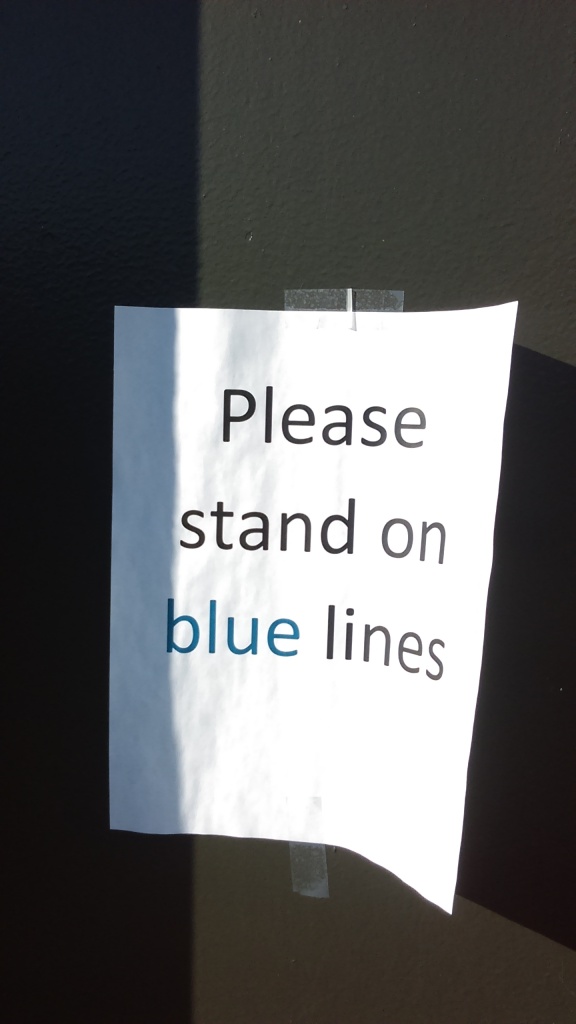
Someone had the brilliant idea to put a desk outside the window. It was useful for setting food down but it also forced distance between the staff and those of us seeking food.
When it was my turn, I mentioned my allergies. The staff tried to pull out everything that I am allergic to, but I still found things when I got home that I gave away because I couldn’t eat them. I saw the stress in their body language, and I made sure to be patient and grateful in how I held myself and spoke. These are people who probably pride themselves on the typical excellence of their service. In addition to whatever other stress the pandemic is having on their personal lives, here they were volunteering their time to provide a much lower-quality service than they are typically able to do. The person at the window became less agitated by the time they were done working with me. I’m happy for that. The staff also did their best to find me replacement items for what they took out of my bag.
Due to a series of illnesses, injuries, and so on combined with my intentional hermiting to successfully participate in NaNoWriMo (follow me here for updates on my book), I have been socially isolated except for work and choir rehearsal since the beginning of November with only a few weeks of relief. This means that part of what I’m experiencing is watching everyone else freak out on social media about the strain of the isolation, while I have tools to deal with it. That’s why I wrote this post yesterday (it will be dated as today because I posted it after midnight last night). It shares that knowledge, in the hopes that others will benefit from it. It’s fascinating watching everyone suddenly turn to the kinds of digital connection that have been my lifeline for so long. My socializing is actually expanding as more people get online. It’s just kind of sad that the timing lines up with when I’m finally healthy enough to connect in person.
I think, going back to where I started this writing, that the biggest challenge for me and for many of the people in my life is the change. It’s the high number of changes. It’s the significant nature of those changes. It’s the rapid rate of additional changes. All this is exacerbated by the uncertainty. Until today, when I got accepted for unemployment benefits, I didn’t know how I would be able to pay rent. I was terrified of ending up homeless. We don’t know how long this situation will last. We still don’t know very much about Covid-19. We don’t know how many people actually have it, due to inadequacy of testing. We won’t have a vaccine for at least another year. What will life be like by then? What about the long term? Will the planet die because we got so distracted by this pandemic that we forgot to solve our climate crisis? Should I be creating a physical copy of this in case the internet stops being a thing?
Monday, March 23, 2020 (Seattle, WA):
This morning, I took my organic chemistry final exam. For weeks, the logistics surrounding this exam have been in flux. First we were told we could come back for the final. Then, we were told students had to be limited to groups of 8 or fewer, so our professor would be running the final several times throughout the course of the day on which the final was originally scheduled to take place after assigning each of us to a time slot. Several iterations later, we landed on the final solution: Our teacher sent us the exam as a PDF on the morning of the final, which we printed out, completed, scanned, and sent back digitally before the time limit was up.
After that, I took a break for lunch and enjoyed the sun by planting some of my early food crops. I have been fearful about the greater systems we rely upon collapsing, so it feels hopeful that I may have come direct control over my food supply soon.
In the afternoon, I left the house again for the first time since the trip to the hardware store. I wanted to mail a card I had made for someone, and pick up some basic food supplies. While I was shopping, Governor Inslee announced an emergency “stay at home” order, and shut down basically everything except groceries and medical practices. All “non-essential” businesses are to close the day after tomorrow for a minimum of two weeks. Tomorrow, the stores are going to be overrun. I am so very glad I went today.
I have some pictures that I took while out today, to showcase what it’s like. It’s really rather eerie. Big parking lots of what I know to be bustling shopping centers sit empty in the middle of the day, except if there is a grocery store involved. Restaurants have already been closed due to Seattle City orders. Some put up nice signs about it, others handwritten. Some didn’t even bother; they just sit empty with the lights off. I’ll write more after the pictures:
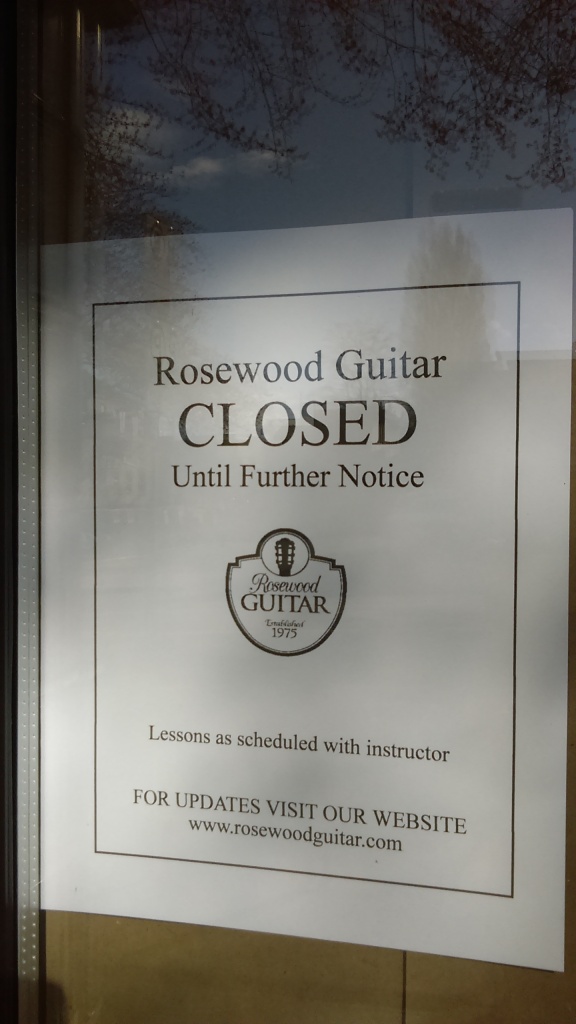
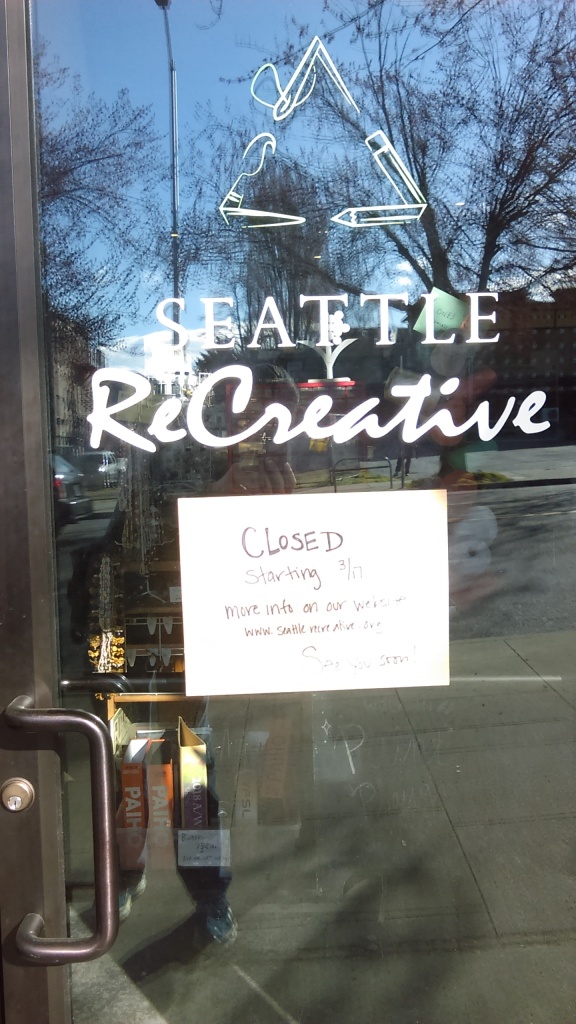
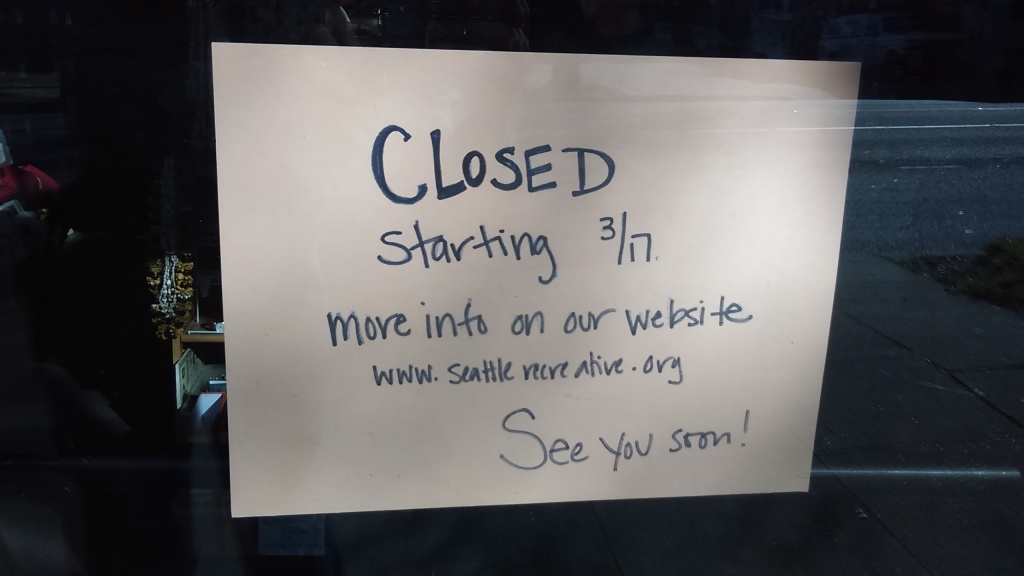
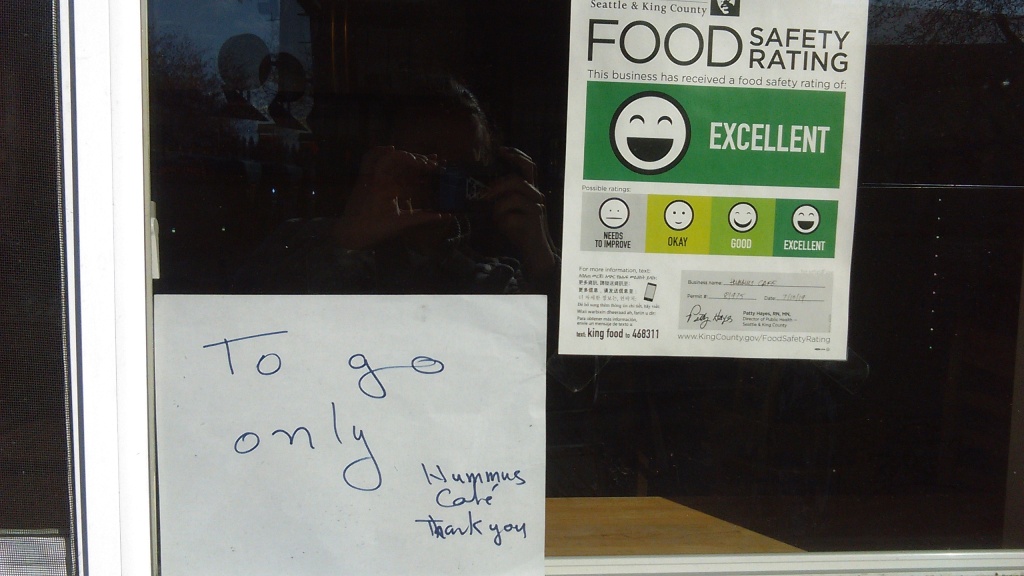
As I walked around, I noticed something unusual. Chocolati, a popular coffee shop, was open! Surprised, I walked across the street to investigate. They are operating under reduced hours. This location is set up so that customers walk in to the area where the baristas work behind the counter. Beyond that area are the popular tables. I had no idea that Chocolati had doors that could close between them, but they do, and they were closed when I walked into the coffee shop today. They also had little signs on the two chairs in the room saying not to sit down on them.
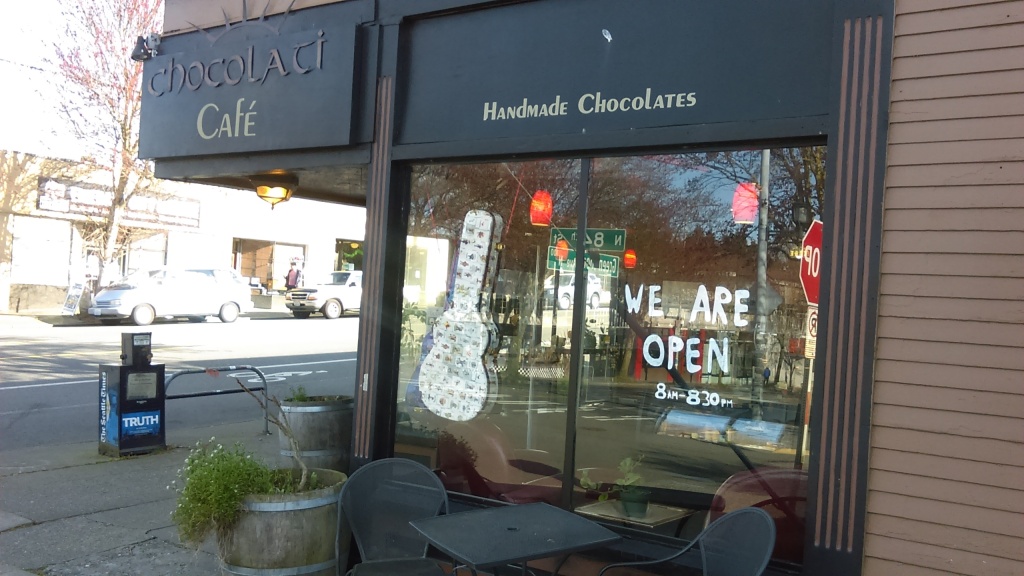
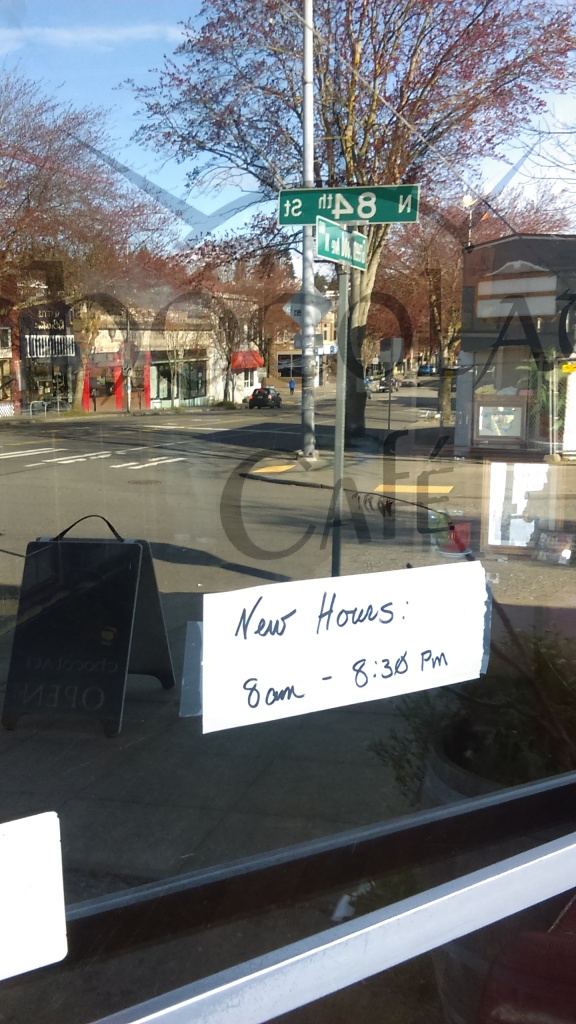
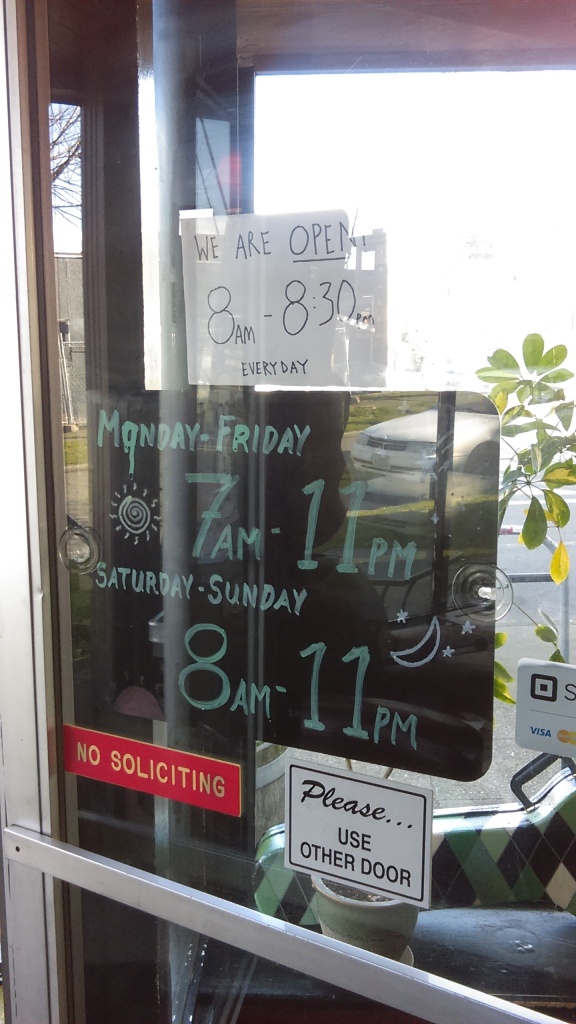
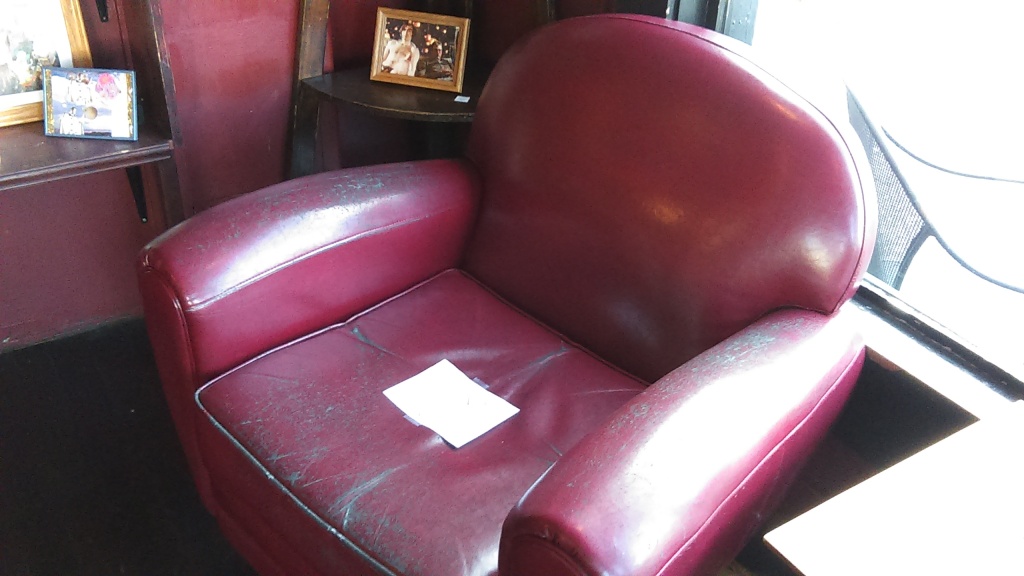
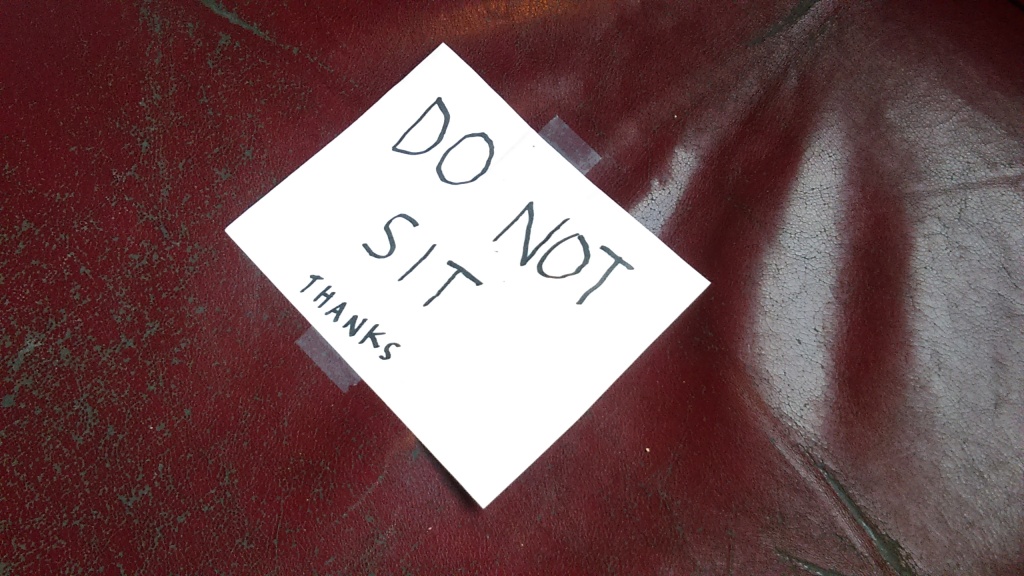
After I walked around the area for a bit, I went to two different grocery stores. I also took pictures there to show the impact Covid-19 related closures are having on them. Whole aisles missing every last bag of flour. Signage telling people to stay two carts apart. Those kinds of things. I will post them another day; for now, it’s well beyond my bed time.
And in case you were wondering, I found out a few hours ago that totally aced the organic chemistry final exam I took this morning. I earned 153/150 points.
Friday March 27, 2020 (Seattle, WA):
Yesterday a friend of mine from my choir said, “Every day feels like a week. Every week feels like a month.” This resonated very strongly with me, and seems to be similar to how many people are feeling right now.
Our choir has moved to online rehearsals. Through Zoom, we hold abridged weekly rehearsals on Wednesdays. We all keep our mics muted, and our director sings each part one at a time along with his piano for each section to sing along in the privacy of our individual homes, unable to hear one another. This began last week, with our first digital rehearsal on Wednesday (March 18th). I was unable to participate for technical reasons.
One of my other choir friends agreed on Thursday last week to come over for rehearsal this week. My friend was going to bring equipment and come early enough to enjoy sharing a meal. Over the weekend, things had already changed so much that we agreed to touch bases on Tuesday (March 24th) to see what we would end up doing, and both of us acknowledged that even if we said “yes” on Tuesday, it might become a “no” by Wednesday. Tuesday (March 24th) snuck up on us. I commented to my friend that it seemed like last week’s rehearsal had been a month ago. My friend agreed, and suggested this was due to how much had changed. We both decided due to Governor Inslee’s order to stay home (which came out on Monday March 23rd and went into effect on Wednesday March 25th) that we should not get together for rehearsal.
I haven’t updated over the past few days because things have changed so rapidly I haven’t had time to write. I regret this, as I was hoping to capture the rapid nature of change by profiling each day as it happens.
I mentioned financial woes above. On Monday morning, I got an e-mail inquiring whether I was interested in a particular long term temporary job. I responded that I was. That afternoon, I had a job interview by phone call. After that, I went to do the errands described above. While I was out, I took pictures at various markets of entire shelves sold out of toilet paper and flour, or very low on menstrual products, cooking oil, and yeast. I haven’t posted those, but I will. My apologies to future historians; you’ll have to piece together the timeline. I am not going to edit what I have written here, in the interest of keeping it as real to what I believe at this time as possible.
Anyway, I exchanged a few e-mails about the job while I was out. By the time I was almost done grabbing my basic necessities and taking pictures for this post, I had a job offer that I had also accepted, and a start date set for Wednesday, March 25th. As I was leaving the last store, I got an e-mail from one of the campuses where I work about the school’s response to the governor’s emergency stay at home order, which was to take effect on Wednesday, March 25th. This is how I discovered that there was such an order.
I immediately responded to the thread about the job and offered to rearrange my schedule to allow me to come in on Tuesday, March 24th for training due to the governor’s order. This was found to be desirable, and I suddenly found myself going from waiting desperately for my first unemployment deposit to working a full time 8am-5pm M-F, 40 hour per week job. I spent most of Tuesday training, and was sent home with a computer and related gear to get myself set up to work from home, which I have been doing ever since. It is surreal.
This job is a long-term temporary job. It will disappear in a few months. That is also when I suspect I will finally be able to return to my other jobs. However, that return is not certain. Nothing is. Knowing that I have solid income for the next few months has washed away piles of stress. I knew that I was stressed out over money; I don’t think I realized just how much it was affecting me until I felt this relief. Now, it’s hard to remember that only a few days ago I was struggling so much more.
My community is split. People who can work from home, are working from home. Everyone else is just home. Some are using unemployment benefits, others are struggling to qualify. Two of my friends told me today that they are finally scheduled up with digital social events to a level similar to their lives before all this happened. I think people are starting to adjust to the physical distancing and find a new balance in their lives. The media and a lot of the signage calls it “social distancing.” I am still socially close to my friends. Even if we are physically separated, we are digitally and emotionally connected.
People all over my various communities who have work and money are using it to hire other people in my communities who don’t. Digital tutoring, gardening, and so on. It’s generally seen by people on both sides as a way to move money from the haves to the have-nots. Some of my friends with the most money are going around signing up to support various Patreon pages just to help more people get through this. (Patreon is a web based platform that allows content creators to get their work to patrons, who pay monthly patronages for access. It’s more complicated than that, but that’s the gist.) Everyone knows the economy is broken. Some of us are hoping it means the housing bubble will burst and we’ll have a chance in our lifetimes of being homeowners.
I planted some vegetables right before the governor ordered us to stay at home. I think it will be poetic when they sprout as we are released again. If the end of the orders are delayed beyond that, then I’ll have fresh homegrown food during the lockdown and that’s lovely.
I mentioned earlier about toilet paper being sold out. It was the first thing to go. Now it’s even difficult to find it online. Companies that specialize in online sales of recycled and otherwise ethical toilet paper are sold out. It sold out all over Seattle rapidly, well before the closures were announced, prompting this popular meme:
A drawing of a toilet paper fort in a living room. Two roles are missing, forming a window, with eyes peeking out through the hole. Extra rolls of toilet paper lay about the room. Across the top of the drawing are the words, “meanwhile in Seattle.” The artist signature in the bottom right corner reads “LeLIEVRE.”
I wish I could say when I first saw that meme, but my sense of time is so distorted with the upheaval of every rhythm in my life that I have no idea.
Every time I went out after hearing about the toilet paper being sold out, I perused grocery stores to see what was sold out, out of curiosity. First it was toilet paper, but not menstrual products. I remember this because that second part surprised me. I wasn’t sure if it was testimony to the fact that the affluent people – the ones presumably stocking up – tend to be males hired by the sexist local tech industry (Seattle is home to Google, Facebook, and Amazon headquarters), but I did wonder.
Quickly after toilet paper came hand sanitizer. Next it was rice, pasta, other grains, canned beans, and bottled water. I found that oddly specific for everyone to have the same idea about disaster food. Then, it was vitamin C, bleach, and cleaning products. As each item began to be sold out, it never really went back up to full capacity. Some stores will still have a few of these items on the shelves, but I haven’t seen any of them fully stocked. Finally, the most recent items I have seen sold out or greatly reduced are bread yeast and menstrual products. Oddly, only one store I’ve been to was sold out on sugar. The rest were lower than usual, but not sold out like the flour. I wonder if most people don’t know they need sugar to activate yeast in quick breads.
I am told by friends who live near International District that their stores are not sold out of anything. I have seen headlines discussing the racism Americans are enacting against anyone who looks Asian, by assuming that they are Chinese and proceeding to associate that with Covid-19. If the headlines are correct, then Asian businesses began to suffer losses in or before February, well before the March closures affected everyone. It would not surprise me if the same phenomenon that drove white people out of Chinese restaurants also keeps them out of International District grocery stores. White Americans are generally very good at two things: racism, and denial of racism. I say this as a white American. I’ve seen it in myself, it was how I was raised to be, and it is something I seek to eradicate in myself and help others do the same. In February, I urged my friends with money to go to International District any time they felt like eating out to help mitigate the losses. I was definitely not the only one who had this idea. It flew around social media in Seattle, in various forms. Now, of course, that’s not possible. We can only support the grocery stores there.
I am very lucky to have work right now. When I recover my losses from being very ill and unable to work for most of the year, my job will be over as it is temporary. Hopefully by then, this will have blown over and I’ll be back at my regular jobs. If we are still shut down, then by then the changes the governor ordered to unemployment will have settled into place and I will be fine. It’s still not easy, emotionally. Everyone in my life is suffering in some way, whether that’s due to lack of work, or some variety of guilt-like sensation over having work when so many do not, or the simple suffering of a member of a social species being unable to share touch with others of its kind.
The collective suffering of a people is a weighty thing to witness, especially as a member. I do not know if I am capable of conveying it to people who are not experiencing it. The suffering in this situation is on a massive scale in terms of number of participants. It is also long, drawn out, and agonizing. People are going to die over this, and some of them aren’t even going to have Covid-19. People who lose their homes due to inability to pay rent due to closures, people who can’t find shelter because the shelters are closed, people who can’t get food because the food banks are limited, people who can’t get medical care for other needs because the hospitals are overloaded, people who can’t survive physical social isolation and are driven to end their lives, and so on. If this shutdown doesn’t end at the predicted two-week mark, and/or if the shutdown isn’t enough to contain the virus, things are going to get messy in ways we haven’t seen yet.
I want to share a heart-wrenching story from Tuesday, March 24th:
After I finished training, I ran an errand on the way home, knowing it was the last day to do so for a while. Someone who looked really old to my young 30-something eyes asked me for money. I told the truth; I didn’t have any. We chatted for a while and I learned more about this person. A Vietnam veteran, he had been hospitalized for 5 months due to illness. He was released on Monday. I don’t know if it was because he’s super old, and old people are more likely to contract Covid-19 and more likely to die from it if they get it. Maybe they released him to protect him? In any case, they released him with a pile of antibiotics and sent him home.
When he got home, he discovered that his landlord thought he was dead and had sent all his checks back to the VA. So there he was, fresh out of the hospital with nothing. The VA won’t get him his money until mid-April. He was sitting where I ran into him because he had tried to go to the food bank, which is typically open at that location on Tuesdays. It was closed, and would not open until Thursday. He had no food, no money to buy food, and no access to food at the food bank. I offered him half a bag of bagels that I had left. He said, “I have no teeth,” and pulled back his lips to show me. “I can’t eat them. Thank you though, that’s very kind.” I gave him the oranges I had instead. He graciously accepted them.
I hope he lived long enough to get his food on Thursday. I hope he is okay.
Wednesday, April 1, 2020 (Seattle, WA):
Without going into much detail in this public post, let’s just say that having 4 adults work from home in a 3-bedroom house is far from ideal.
Often times when I look at history, and see people of the past act on wrong information. I read about the flyers during the Dust Bowl that claimed a better life waited in California despite the horrifying poverty that people found there when they arrived. Doctors used to prescribe cigarettes for stress, not knowing that they cause various types of cancer and a wide variety of other health problems. And so on. I sometimes wonder whether people of the past knew they were acting on questionable information.
So, dear historians of the future, I want you to know: at least one person is perfectly aware that the information the world is acting on right now isn’t reliable. On a global scale, every country is doing the best it can to act on inadequate information. This is a brand new disease. Every official recommendation from a government or international organization is based on professional guesswork. We don’t have a treatment beyond treating the symptoms, much less a cure. We don’t really know if the treatments we’re trying are going to work, and we absolutely don’t know the long term impact of what we are doing. All we can do is physically isolate ourselves as much as possible to create as much delay as possible for the researchers to figure out as much as they can before the pandemic gets to its height. It’s a race, it’s not a fun one, and that’s just about the only reliable information we have right now, especially with how many governments are trying to cover up their Covid-19 incidence numbers.
I also have the general impression that a lot of people don’t know that our information is too new to be reliable. People all over social media tout the word of whatever source they have found as objective truth with little to no recognition of the simple fact that this is simply impossible. We do not and cannot know how accurate our information is because we (we as a global species) haven’t had enough time to evaluate and study Covid-19 and any relevant treatments. A lot of people seem to think science happens in an instant. I’m really not sure why they do.
There is no end to the frustration I feel with the spread of misinformation.
Friday, April 3, 2020 (Seattle, WA):
We now know that the stay-at-home orders will be extended here in Washington until at least May 4th. I will be surprised if it doesn’t also go through June. The closing-down of our economy has me feeling grateful to myself for planting a small food garden. I hope I don’t need it; it won’t be enough on its own.
I just scrolled past this article shared on social media:

April 4, 2020. Image description: This is a screenshot of an article shared on social media. The preview image is of a building with a sign that reads, “United States Department of Labor.” The headline from NBCNEWS.COM is “A record 6.6 million Americans filed for unemployment last week.”
The population of the United States was 327.2 million in 2018, counting children. That means about 2% of the nation’s total population – and therefore a higher percentage of the nation’s total workers – applied for unemployment in one week. I am not an economist, but I’m fairly certain that’s significant.
Here in the USA, we can’t do what China did in Wuhan. We can’t throw walls around infected areas and stop all traffic in and out. Instead, we have social campaigns. People are pushing each other towards responsible behavior with social media posts that range from sharing statistics and graphs that point out why self-isolation on a widespread scale is so important right now to the sort of begging that leads one to wonder if the author was sobbing while writing. YouTube or someone on it (I haven’t bothered looking) has begun running frequent ads urging people to stay home. Google, well-known for changing their home page to reflect historical birthdays and other interesting moments, has updated their home page as part of the campaign as well, with each of the letters in their name drawn with limbs and animated, doing an activity inside a house:
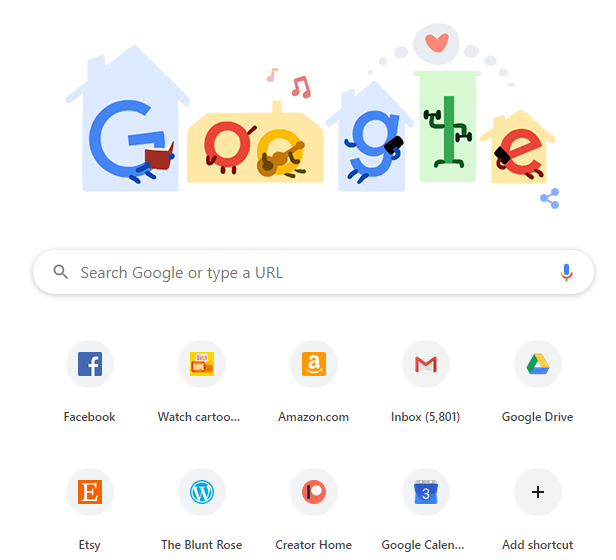
When you click on the Google Doodle, it takes you to an information page about Covid-19 which includes a world map of the spread, and a big alert to “STAY HOME. SAVE LIVES,” followed by the same five steps so many of us keep reading everywhere:
- STAY home as much as you can
- KEEP a safe distance
- WASH hands often
- COVER your cough
- SICK? Call ahead
Here is a screenshot I took today:
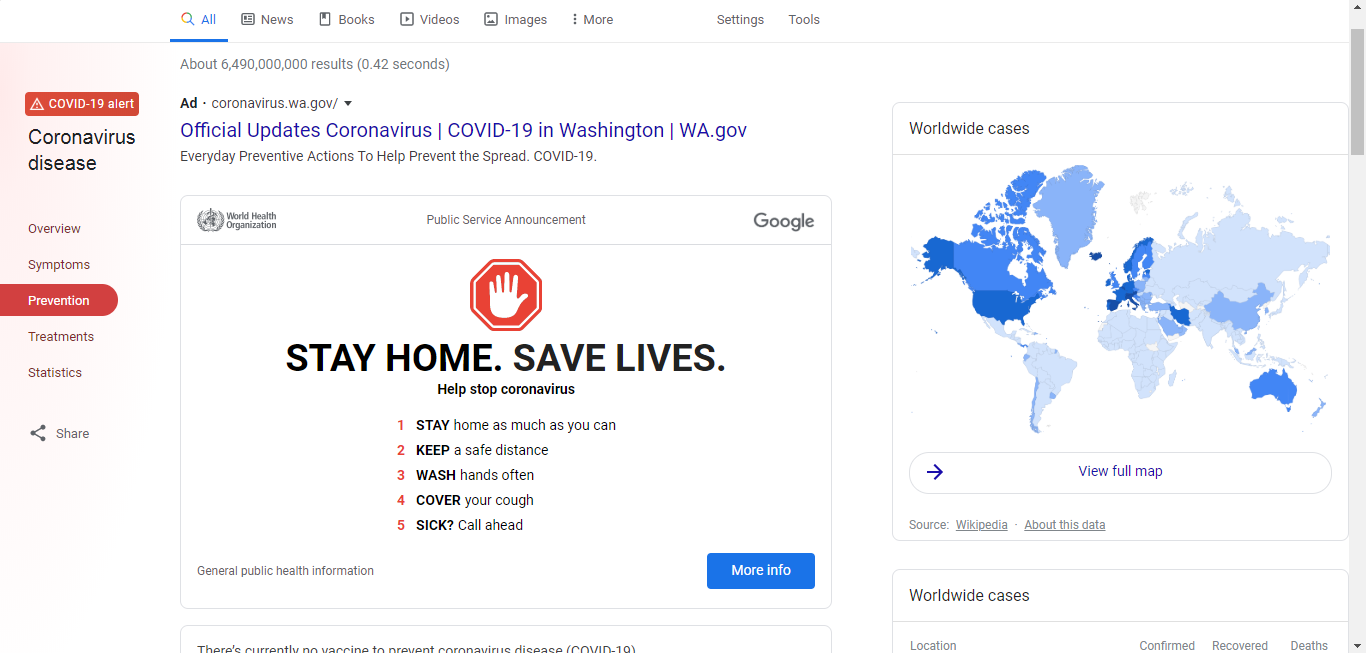
Under the world map in the above screenshot, you can see a block that starts with “Worldwide cases” but is cut off. I scrolled down to the tables below that to provide a screenshot. It’s a mark of the times that I have no idea where the information in this chart came from, no idea how to fact check it, and no idea whether it is true. As a rule, I never share such information. I am putting it here not for my contemporaries to reference, but for the historians of the future to see a snapshot of what people right now generally think is true. Because the fact is, most people will believe whatever Google spits out without fact checking it, especially these parts of the search results pages. Most people don’t understand that Google pulls its information for its little truth box blurby things from the internet with algorithms, not with personal fact checking. I’ve seen blatantly wrong information come up in the little box that Google displays, trying so hard to helpfully give you the right answer without you having to click on sites. I’m glad they’re trying to work on automating fact checking, but it’s nowhere near reliable. Most people believe it is reliable, though. Anyway, here is the table:
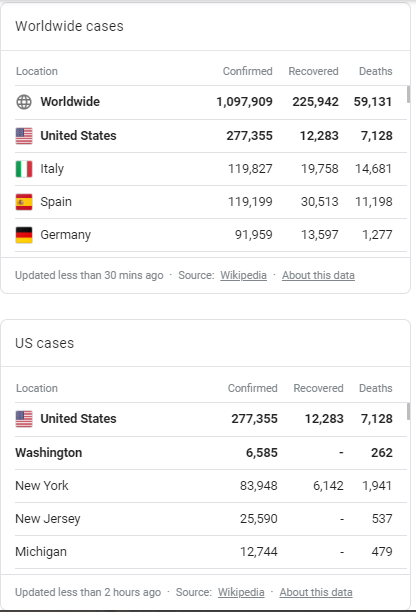
As you can see, these tables have “confirmed,” “recovered,” and “deaths” columns for worldwide and a handful of countries, followed by the United States and a handful of regions within the USA. Some of the entries aren’t filled in. At the bottom of each table, you can see “Source: Wikipedia.” Wikipedia is linked there. Now, Wikipedia is a fantastic resource in a lot of ways. It’s also managed by anybody who decides to make an account. I clicked to the article itself. Let’s take a look at what I found there:
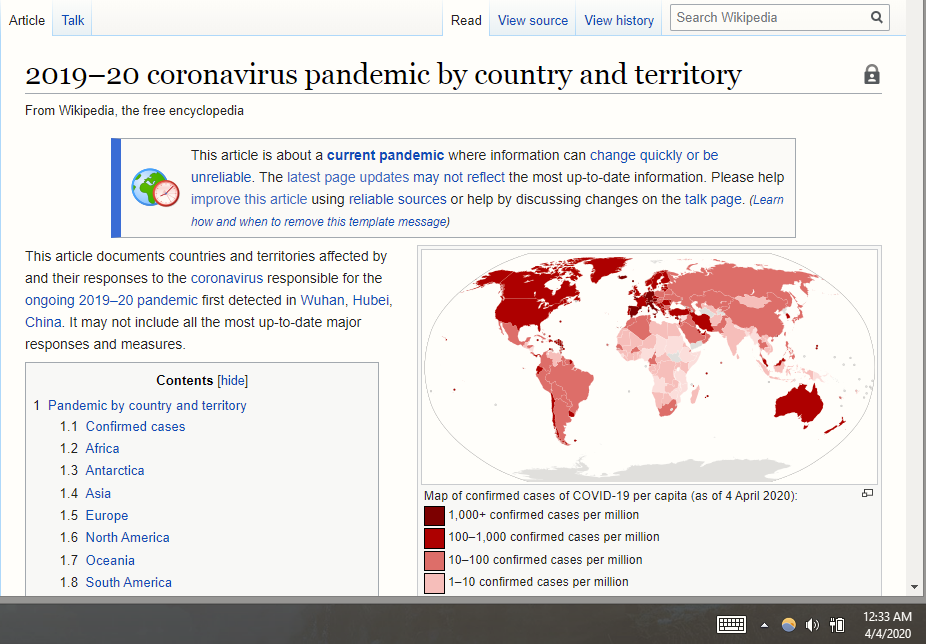
The article is titled “2019-20 coronavirus pandemic by country and territory.” The top of the page includes a blurb about the start of the virus, shows a color-coded global map, and the start of the contents, which have links for each region. Most importantly though, I would like to draw your attention to the blurb at the top, in the special highlighted box, which reads as follows: “This article is about a current pandemic where information can change quickly or be unreliable. The latest page updates may not reflect the most up-to-date information.
Going back to the page where the Google Doodle lead, there is another little hyperlink next to the source, which says “about this information.” I clicked it, and got this pop up box:
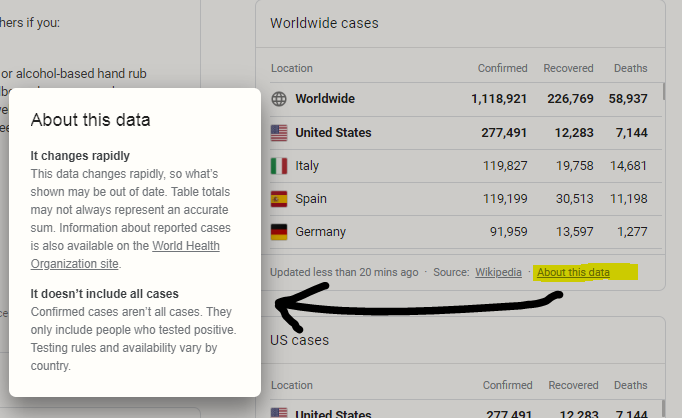
The box shows an explicit disclaimer that the data is changing rapidly and does not include all cases. It says specifically that confirmed cases aren’t all cases, only the ones that test positive. It fails to mention the global shortage on testing supplies and the fact that this means our numbers are significantly incorrect, but hey, at least they are being explicit that the information isn’t reliable. You know, without saying the word “unreliable,” and only in a blurb you have to open by clicking on tiny, greyed out text. Sarcasm voice: I’m absolutely certain people will notice this.
The campaign to apply social pressure to isolate is going on outside of the internet, as well. traffic signs over the highways around Seattle with programmable lights that can display any message with three lines of text now read, “STAY HOME/LIMIT TRAVEL/SAVE LIVES,” (slashes mine) with two words on each line. This one really got to me, because this is the first time I have seen anything other than traffic alerts, Amber Alerts, and Silver Alerts displayed on that equipment. (Amber Alerts alert the public to the license plate and other information associated with a child kidnapping; Silver Alerts are about kidnapped elderly.)
Yesterday, I talked on the phone with a loved one who doesn’t know much about how viruses work. We talked for 30-45 minutes while I explained about human cells, proteins, immune system responses, viral particles hijacking cell equipment to reproduce, the structures that comprise viral particles, the reason why DNA recombination is so much easier in the flu than a lot of other viruses and how that has lead to the collection of flu viruses we have now known colloquially as “the flu” and, finally, about how the information we have about Covid-19 is all so new that no matter how reliable your source is, it’s not reliable. We just haven’t had time to verify any of the things we think we know. He thanked me for saying that out loud, saying he wished more people would do so. He asked me if “the test” is reliable. I explained about how each region has developed its own test, so there isn’t just one. I also expressed that this is even true within the USA, where we haven’t really had a federal response to my knowledge.
Towards the end of our conversation, my loved one asked me if I thought isolation would be successful in containing Covid-19 and preventing it from continuing to spread. I told him my general concept of the situation: In my mind, it’s far too late for that. If the source I read which says Covid-19 can mutate and create a new strain once every other host it moves through is true, then we’re likely to end up with a collection of Covid-19 viruses which, like the collection of flu viruses, is simply a new permanent part of the human existence. Even if it’s not, the virus has already moved through our population beyond our testing capabilities. It’s not going to be “gone by summer” as he was hoping. I am beginning to wonder how many years will be in the range in title of articles written in the future about this pandemic. While I hope that the above article title (“2019-20 coronavirus pandemic…”) remains correct in this sense, I would also not be surprised if historians of the future who are familiar with this pandemic squint at it or find it funny. It’s yet another example of people of this time making sweeping assumptions without enough information. You may notice that the title of this post doesn’t have years. I did that on purpose because I am a scientist, and that means I am careful about my unknowns.
2% of my country’s people applied for unemployment this week. Something like 40 of our 50 states have put some kind of isolation or shut down mandates into effect. I have the sensation – with little evidence to support or refute it – that we are just at the beginning of a very long shut down across the nation despite no federal response. People are already suffering from medical resources being shifted to handle Covid-19. I know people who may die or suffer significant irreversible but preventable damage because of inability to access treatment for conditions that are totally unrelated to Covid-19. This is a really bad time to need a doctor for much of anything. I can only hope other nations are handling it better than we are.

